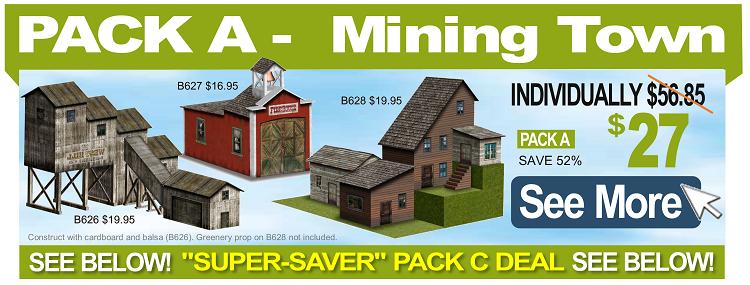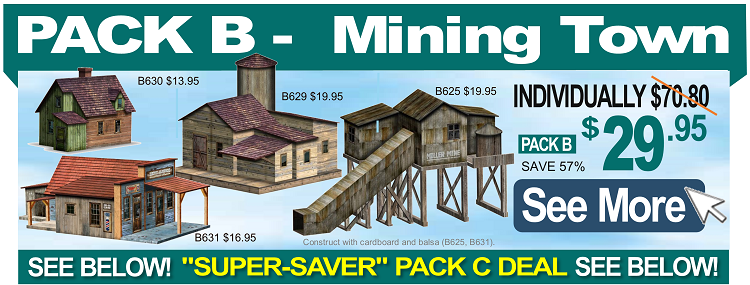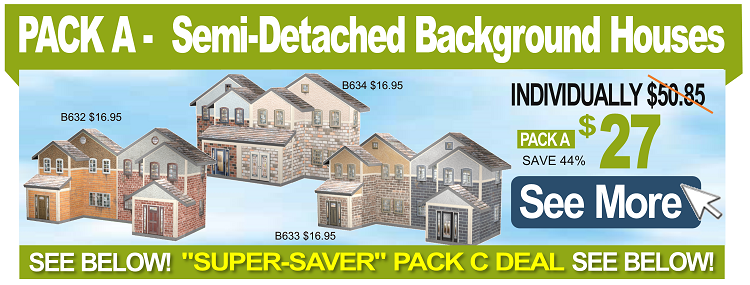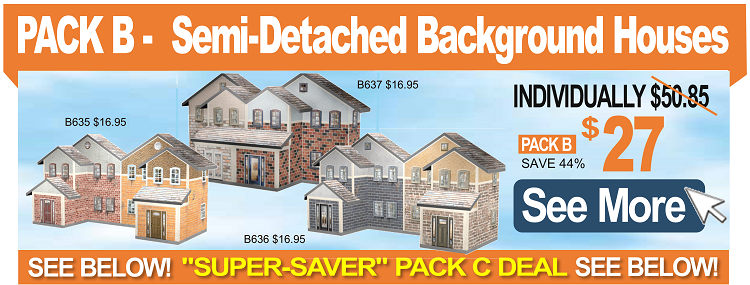Use these FREE RESOURCES With Our Compliments:
Scale Calculators, Downloadable Train Room Signs, a Sample Model
Railroad Building , and a Free Catalog to Keep Alongside Your Layout…
FREE CATALOG
See the full range of model railroad building plans and keep up to date with what’s new.
CLICK HERE to download your FREE CATALOG
FREE MODEL RAILROADER CALCULATORS
Use the Scale Conversion Calculator, Scale To Scale Converter, Track Grade Calculator, Helix Design Calculator,
and Scale Speed Calculator.
CLICK HERE to access your CALCULATORS
17 FREE TRAIN ROOM SIGNS TO DOWNLOAD & SHARE WITH FRIENDS
These fun signs can be downloaded and printed on your home computer, and even be laminated if you
choose. They will be a great talking point in your train room next to your layout. Free to download and
share.
CLICK HERE to access the TRAIN ROOM SIGN FREEBIES
FREE SAMPLE PLAN
Download a plan to try out for yourself. Constructing realistic replicate model structures is a lot of fun, and
we know you will be impressed with what you construct.
CLICK HERE to download a COMPLIMENTRY SAMPLE PLAN
FREE MODEL RAILROADING ARTICLES
This information is designed to assist hobbyists with planning, maintaining, and operating their layouts.
Building your own model railroad buildings is easy and fun.
To get started you just need some basic tools:
- A cutting mat of some kind
- Steel ruler
- A small right-angled square
- Craft knife (replace the blade regularly as a sharp blade gives a cleaner cut)
- Glue stick (perfect for adhering paper to card)
- Clear all purpose glue (solvent free)
- Super glue or CA (perfect for the little fiddly bits)
- A pencil
- Felt tip pens (for touching up the edges and corners)
- Tweezers
- Fine sand paper (for smoothing any rough edges)
- Artist’s matt spray
- Damp cloth (To wipe the glue off your fingers)
How to Build Model Railroad Scenery – The Basics
By Guest Contributor Frank Richardson
This article will tell you all the basics that you need to know in order to start building model railroad scenery. Following are the basic steps that you need to take in order to start building your railroad:
1. The first thing you need to start with is the passion for building railroads. For this you need to fuel the fire by visiting train shows, model train shops, and friends who share your enthusiasm of designing railroad sceneries. These days there are so many resources to help the hobbist get started in model railroading.
2. Look into different gauges, brands, scales, and styles of model trains. Calculate the amount that you are willing to spend on this new found hobby. Sift through railroad magazines and websites. This will help you picture the overall look that you want to give to your railroad layout and scenery.
3. Choose the space in your house where to want to set up your railroad. Measure the space so that you can select a suitable scale to fit the space. The most common train scales are HO (USA) and OO (UK) so there are usually lots of resources and supplies available for these train scales. The next most common scale is N scale which is quite a bit smaller than HO scale or OO gauge trains. Not everyone wants to build a big railroad with lots of track filling an entire room. Also not everyone has the space or can afford a really large layout. Before you finally decide which scale you’re opting for, have a good look around the net and see what other hobbists have achieved with the various train scales.
4. Plan the railroad. This will help you in designing the scenery, backdrop, and buildings that you want to add in your design. Sketch it all out so that you can always refer back to it to measure your progress. Always keep room for future additions to your railway. My recommendation is to start off in a small way and gradually expand your layout (in modulars) over time, always allowing in advance the space to expand. It makes no sense to just keep adding onto the train track and scenery without the end result in mind.
You can look on internet and train magazines for ideas of different railroads. Select a theme around which you will build your layout.
5. The next step is to build a platform (also known as benchwork or a baseboard). You can choose plywood to build your platform because it is easier to drill and cut. Make sure that you build a sturdy platform that does not sway or bend. It also needs to be strong enough to support an incredible weight. It’s not just the weight of the trains and track, but also the weight of the scenery, structures, and even the weight of people when they lean on it. You will be amazed just how heavy a completed layout can become.
6. Start designing the scenery and backdrop as per the sketch that you have made for your layout. Place the mountains, rivers, and valleys. There are many landscaping kits available in the market that you can purchase to get help in scenery construction. Take as much time as you look like to make your scenery look as real as possible.
7. Layout the tracks before you attach them to the base of your layout. You can either glue or pin your tracks. Clip the tracks together before you secure them with glue or pins. If you are using glue then make sure that you let it set for a night. Don’t be tempted to operate your trains until the tracks are firmly in place.
8. Once your track is in place and you have laid out the basic scenery structures like mountains and valleys, it is time to add the details. Add train stations, buildings, billboards, bridges, tunnels, people, and cars. You have the choice of making these structures from scratch or using the ones already made from the kits.
Always remember that you are trying to portray a community, farm, or countryside. So make sure that whatever you place in the layout has a reason for being placed. Avoid doing anything that does not look a part of the theme that you are trying to depict
9. You can add trees, grass, shrubs and bushes, roads, and seasonal effects to give your layout a more realistic look.
The most important thing to consider, before you start following the given steps, is to thoroughly research the theme that you want capture in your railway. You need to make sure that everything from the trains, to tracks, to stations, to buildings, roads, people, and advertisements should be according to the era that you plan to depict in your railroad. This will not only give your railroad a realistic feel but it will also breathe life in your overall layout. Now that you know all about how to build model railroad scenery you can start designing and experimenting with different railroads and designs. You can get track plans in books and from the internet.
There is no shortage of ideas on the internet and in model train magazines. One recommended resource is Robert Andersons Online Model Train Club which is well worth joining if you are serious about the hobby. Never stop learning otherwise life could become rather boring.
The point to always remember is the reason why you are involved with this hobby. If you are like most others, it is to enjoy yourself first and foremost. The fact that you learn so many new skills along the way, and make new friends, is an added bonus. You can also use visiting a model train show as your excuse to take a vacation or visit a town or city you have never been to before. In fact some modelers spend more time traveling the country and the world attending train shows than they do at home or at their own railroad layout. And, good on them, if that’s how they like to enjoy this short time we have on this planet.
There are free plans for paper model buildings available on the internet, but be warned, when there is no charge the quality of these paper and cardstock plans can be very poor which will make your model railroad buildings look fake. However, be assured, the 160+ paper model plans advertised for sale on this website are of the highest quality. And, to judge for yourself, you will see a link (above) for a paper model buildings free download. This free download plan of a General Store can be constructed in HO scale, N scale or in OO gauge and assembled using paper, cardstock, or corflute. The quality of the above free model railroad building plan is excellent.










